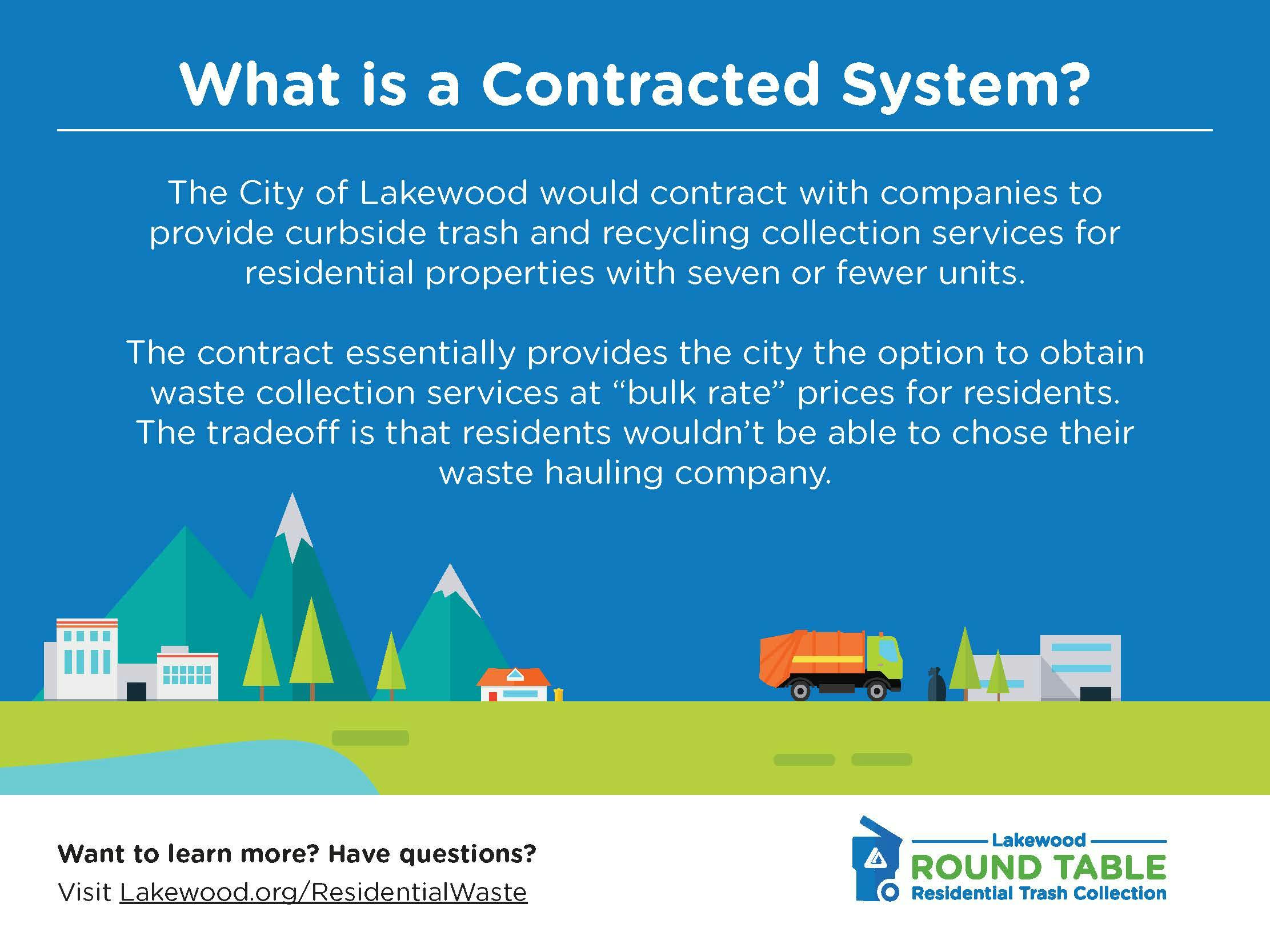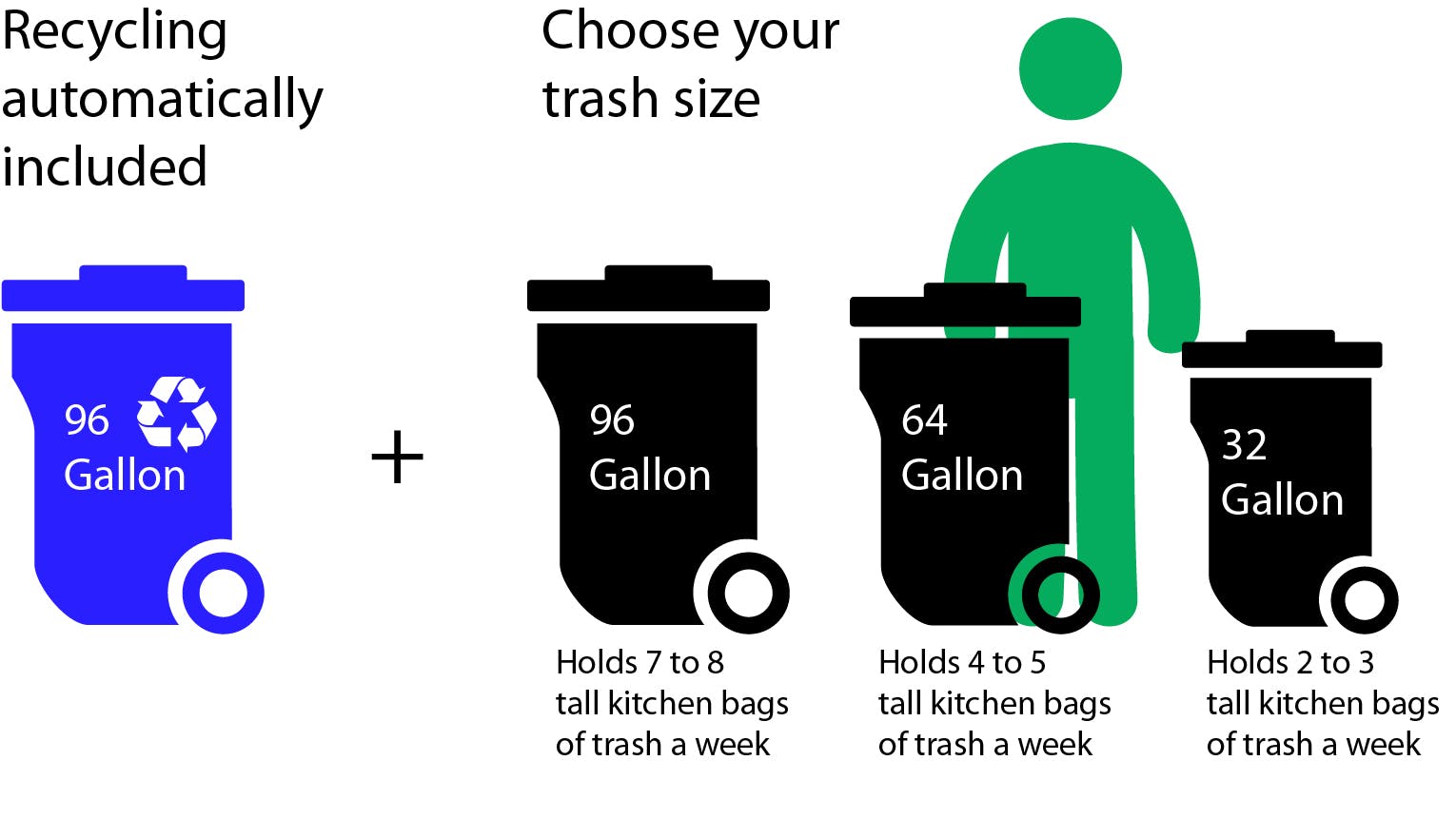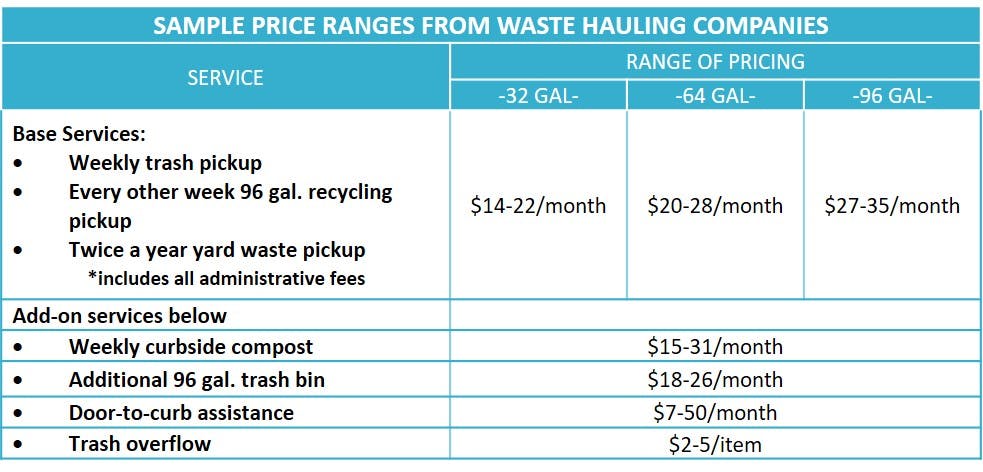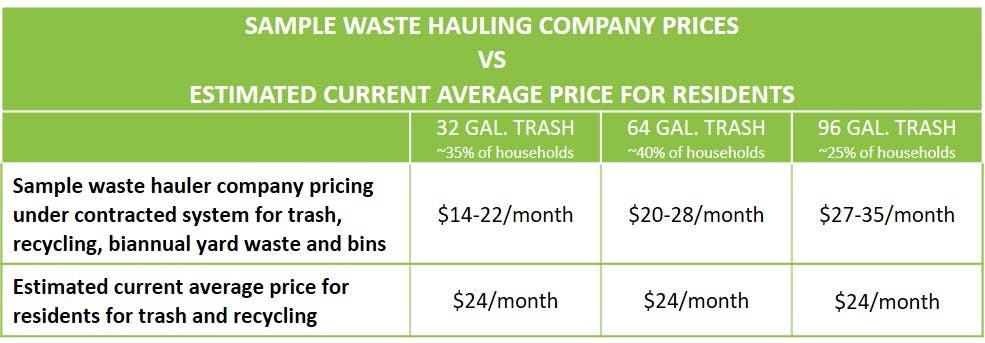Ballot Question: Residential Waste Collection
Consultation has concluded
Consultation on this topic has concluded. Results of the ballot question can be viewed on the Jefferson County election results web page. Thank you to everyone in the community that participated in this important discussion.
![]()
Consultation on this topic has concluded. Results of the ballot question can be viewed on the Jefferson County election results web page. Thank you to everyone in the community that participated in this important discussion.
![]()
-
What will the ballot question say?
Share What will the ballot question say? on Facebook Share What will the ballot question say? on Twitter Share What will the ballot question say? on Linkedin Email What will the ballot question say? linkCLOSED: This discussion has concluded.SHALL THE CITY OF LAKEWOOD, COLORADO, IN ORDER TO INCREASE ACCESS TO RECYCLING AND COMPOSTING SERVICES, REDUCE NEIGHBORHOOD TRASH TRUCK TRAFFIC, AND ESTABLISH TRANSPARENT PRICING AND CUSTOMER SERVICE STANDARDS, BE AUTHORIZED TO CONTRACT WITH ONE OR MORE PRIVATE WASTE HAULERS VIA A COMPETITIVE BIDDING PROCESS TO PROVIDE WASTE, RECYCLING AND SEASONAL YARD WASTE COMPOSTING SERVICES TO ALL LAKEWOOD RESIDENCES OF SEVEN OR FEWER UNITS AND TO IMPOSE FEES ON SUCH RESIDENTIAL PROPERTY OWNERS AT A BASE AMOUNT FOR WASTE AND RECYCLING, WITH OPTIONAL SERVICES FOR ADDITIONAL COST, WITH ALL SERVICES NOT TO EXCEED AMOUNTS AND ANNUAL INCREASES AUTHORIZED BY CITY COUNCIL, EXEMPTING ALL SUCH REVENUES FROM THE LIMITS OF ARTICLE X, SECTION 20, OF THE COLORADO CONSTITUTION, WHILE PROVIDING HOME OWNER ASSOCIATIONS THE CAPABILITY TO OPT OUT OF SUCH REQUIREMENTS?
YES ________ NO ________
-
Contracted System Overview
Share Contracted System Overview on Facebook Share Contracted System Overview on Twitter Share Contracted System Overview on Linkedin Email Contracted System Overview linkCLOSED: This discussion has concluded.
What is a contracted system?
The City of Lakewood would contract with waste hauling companies through a competitive bidding process to provide curbside trash and recycling collection services for residential properties with seven or fewer units. Private companies would still pick up the trash and provide curbside recycling and other services based on the requirements of a city contract. The contract essentially provides the city the option to obtain waste collection services at “bulk rate” prices for residents. This contracted system is currently used by more than 10 other cities along the Front Range.
Why is Lakewood considering this ballot question?
The city is considering this system as a way to address concerns residents have raised for several years about the waste collection system in the city. These concerns have been raised through public participation in the city’s Comprehensive and Sustainability plans and through extensive public outreach. The concerns included the following items:
- Multiple trash trucks on residential streets leading to noise, pollution and other neighborhood impacts
- Prices of services
- Lack of recycling and compost services
What are some of the drawbacks of the contracted system?
Residents expressed concerns related to changes in the waste collection system including the following items:
- Loss of the ability to choose their own waste hauling company
- Role of government and the impact of any policies on market dynamics
- The administrative costs and burdens on the city organization
Does the city have goals about waste and recycling collection?
The city’s Comprehensive and Sustainability plans include the following goals that would be addressed by a contracted system:
- Clean and safe neighborhoods (Comp. Plan pgs. 4-14)
- Air quality and greenhouse gas emissions (Comp. Plan pgs. 7-8; Sust. Plan pg. 26)
- Waste diversion and recycling (Comp. Plan pgs. 7-16 and 7-17; Sust. Plan pgs. 74, 82, and 83)
What would the government’s role be in a contracted system?
The City of Lakewood would be responsible for overseeing the contract(s), providing education and outreach, and supplementing the waste hauling company’s customer service requirements. It has not been determined if the city would play any role in the billing process.
How would this new system address community concerns like trash truck traffic, environmental impacts, available services, and pricing?
It could reduce neighborhood trash truck traffic because a limited number of companies would serve residents under the contract. The city’s contract would also ensure transparent pricing for residents, set customer service requirements for the waste hauling companies, and increase the availability of recycling and composting services. Your City Council members would also have more oversight of these companies and how they operate, but the tradeoff is that you would be limited in your choice of trash companies.
How many companies would there be?
The city would be divided into three districts. Contracts could be awarded to one company per district, or one company could be awarded two or all three districts. The City Council would determine how many companies would receive a contract.
How long would the contract last?
The proposal would be for a three-year contract. After that, the City Council would decide whether to renew the contract for an additional two years or to open a new bidding process at that time. The contact would not run longer than five years, at which time it would be rebid.
Which households would be included in the contracted system?
All residential properties with seven or fewer units would be included in the contracted system, which would cover single-family homes, townhomes, duplexes, and small apartment complexes. Homeowners associations (HOAs) would be given the ability to opt out of the system if they are providing similar types of consolidated services.
Would I still be able to keep my choice of company?
According to Colorado state law, residents have the right to hire their own company for waste hauling services even if the city has a contracted system; however, those residential property owners would still be required to pay a fee into the contracted system.
Would my homeowners association be included in the contracted system?
Homeowners associations (HOAs) would be given the ability to opt out of the system if they are providing similar types of consolidated services.
Would my apartment be included in the contracted system?
Only complexes with seven or fewer units would be included in the contracted system. Multifamily residential properties with eight or more units would still need to have each of their own contracts for waste collection services.
How would this affect market competition?
The city would get new bids for collection services every three to five years, providing opportunities for waste hauling companies to compete for the contract through an open market competition. Companies that are awarded a contract would receive a guaranteed market share, but companies that are not awarded a contract would lose a significant number of their Lakewood customers.
Have other cities implemented this type of system?
More than 70% of U.S. cities use a similar trash and recycling system, either through a contracted system or through city-run trucks. On the Front Range, more than 10 cities have a contracted system for trash and recycling including Commerce City, Dacono, Edgewater, Frederick, Greenwood Village, Golden, Lafayette, Lone Tree, Louisville, Morrison, and Sheridan.
Explore answers to other frequently asked questions about a contracted system by topic:
- Pricing
- Waste Services
- Trash Truck Traffic Impacts
- Customer Service
- Recycling Impacts -
Pricing
Share Pricing on Facebook Share Pricing on Twitter Share Pricing on Linkedin Email Pricing linkCLOSED: This discussion has concluded.
What much would I pay in the contracted system?
Prices would be based on bin size, allowing households that produce less trash to pay lower rates. This is often referred to as volume-based pricing or pay-as-you-throw. All households would receive a 96-gallon recycling bin and would choose from three trash bin sizes.
The final prices would be determined if a ballot question were approved and after the city negotiated the contract. The prices presented show a sample range of pricing from the waste hauling companies that bid on the Request for Proposals.

Customers would receive a set charge for any overflow trash that is in addition to what fits into their trash can. See the pricing chart for the range of sample pricing received from waste hauling companies that bid on the city’s Request for Proposals.

Why is volume-based pricing being considered?
In a volume-based pricing structure, households pay based on what they use, similar to electricity and water. By recycling more and finding other ways to generate less trash, households could select a smaller size and pay less. Based on results in other U.S. communities using volume-based pricing with curbside recycling, the majority of residents could save money on their trash service. In addition, it is estimated that it would help Lakewood keep more than 38 million pounds of waste out of the landfill each year.
Does this system increase prices for Lakewood households?
For households that currently have trash and recycling services, it is estimated that 35% of households would pay lower rates, 40% would pay similar rates and 25% would pay higher rates in the proposed contracted system. For households that currently only pay for trash collection, more of those might pay a higher price under the contracted system.

How would the city keep prices low/fixed for years to come so they don’t increase every year?
Prices would be set for two years under the proposed contract language. A company could propose a price increase after two years, but the city would have to approve the request. Additionally, the proposed contract language would limit the requested increase to 2.5% and cap it at 5% over a five-year contract.
Would there be hidden fees on my bill?
Prices in the sample price ranges from waste hauling companies chart include all fees. The proposed contract language prohibits any additional fees beyond those explicitly listed in the contract.
Would different districts have different pricing?
If different companies were awarded contracts for different districts, the pricing could vary between districts, similar to how the various water districts serving residents in Lakewood have different prices for water service to homes.
Will I receive new trash and recycling bins?
Yes, the city would work with the hauling companies to provide new trash and recycling bins in order to provide efficiencies and safety with trucks and to ensure all bins have lids. The Request for Proposals requires companies to include the cost of the bins in the customer’s base rate.
Explore answers to other frequently asked questions about a contracted system by topic:
- Contracted System Overview
- Waste Services
- Trash Truck Traffic Impacts
- Customer Service
- Recycling Impacts
-
Waste Services
Share Waste Services on Facebook Share Waste Services on Twitter Share Waste Services on Linkedin Email Waste Services linkCLOSED: This discussion has concluded.
What type of waste collection services would be provided in the contracted system?
Based on the proposed contract language included in the RFP, services provided to households would include the following:
- Curbside trash
- Curbside recycling collection for no additional fee
- Yard waste curbside collection at least twice a year for no additional fee
- Add-on services residents could opt to use for additional fees: weekly curbside compost collection for food and yard waste; bulk item collection (couches, large appliances, etc.); and door-to-curb bin service for assistance getting bins to the curb
Would the new system include compost for yard and food waste?
The proposed services include yard waste curbside collection at least twice a year for no additional fee. For an additional fee, households would have the option to sign up for weekly curbside compost collection for yard and food waste.
What services would accommodate seniors and others with disabilities that cannot pull their trash bins to the curb?
Households that need assistance maneuvering bins to the curb would have the option to sign up for door-to-curb service for an additional fee.
What services would accommodate those with horse manure, agriculture, and other special waste circumstances?
The hauling company would be required to work with customers to address unique circumstances. In some instances, the household would need to contract with another provider for special collections.
Explore answers to other frequently asked questions about a contracted system by topic:
- Contracted System Overview
- Pricing
- Trash Truck Traffic Impacts
- Customer Service
- Recycling Impacts -
Trash Truck Traffic Impacts
Share Trash Truck Traffic Impacts on Facebook Share Trash Truck Traffic Impacts on Twitter Share Trash Truck Traffic Impacts on Linkedin Email Trash Truck Traffic Impacts linkCLOSED: This discussion has concluded.
How would a contracted system change the number of trash trucks in neighborhoods?
For most residential streets, the number of trash trucks could decrease in a contracted system because there would only be one company providing service under the contract. Currently, a typical neighborhood street experiences an average of 10-12 truck passes every two weeks. Under a contracted system, neighborhood trash truck traffic could be decreased to an average of three passes every two weeks, but it could be five passes to accommodate add-on services such as weekly composting.
How would fewer trash trucks on neighborhood streets help?
Trash trucks are among the most polluting vehicles on residential streets. Nearly 90% of U.S. trash trucks are diesel fueled, which produces an exhaust that includes substances that have been proven to be detrimental to human health, including nitrogen oxides and particulate matter. These trucks average less than 3 mpg, and their constant accelerating and decelerating between stops poses a challenge for exhaust systems that work better at higher speeds.
These trucks also cause substantial damage to city streets, both because they are typically much heavier than other delivery vehicles and they make very frequent stops. According to the Colorado Department of Transportation, a local street wears out over 7,000 times faster for each additional trash truck.
Explore answers to other frequently asked questions about a contracted system by topic:
- Contracted System Overview
- Pricing
- Waste Services
- Customer Service
- Recycling Impacts -
Customer Service
Share Customer Service on Facebook Share Customer Service on Twitter Share Customer Service on Linkedin Email Customer Service linkCLOSED: This discussion has concluded.
Who would be managing customer service and who would I call for problems?
As part of the contract, companies would provide designated staff contacts for Lakewood customers and would be required to maintain specific levels of customer service and accountability through the following provisions:
- Providing a designated customer service contact to resolve customer issues, questions, and complaints.
- Providing the city with ongoing logs of all disputes, complaints, and resolutions.
How can I be sure my recycling is getting recycled (or that my organic waste is being composted)?
As part of the contract, companies would provide the city with regular reports of volumes of waste disposed by type (recycling, compost, landfill) and the disposal facility to ensure that materials in the recycling bin are being recycled and the materials in the compost bin are being composted.
Explore answers to other frequently asked questions about a contracted system by topic:
- Contracted System Overview
- Pricing
- Waste Services
- Trash Truck Traffic Impacts
- Recycling Impacts -
Recycling Impacts
Share Recycling Impacts on Facebook Share Recycling Impacts on Twitter Share Recycling Impacts on Linkedin Email Recycling Impacts linkCLOSED: This discussion has concluded.
How would a contracted system affect recycling in Lakewood?
It’s estimated that current recycling efforts are diverting only 10% of the waste in Lakewood. Based on research and an assessment by the Sustainability Division, the amount of waste diverted from the landfill is expected to increase by an estimated 29% in a contracted system because of the combination of volume-based pricing, curbside recycling services, curbside yard waste compost services, and optional curbside compost services. It is estimated that this would result in nearly 38 million pounds of waste diverted from the landfills each year.
Does material actually get recycled or just dumped in the landfill or a foreign country?
The majority of the recycling collected in Colorado is recycled in the U.S. After it is collected from your home, your recycling is transported to a materials recovery facility (MRF). There are two such facilities in Denver and one in Boulder. At the facilities, the materials are separated and cleaned up, and then shipped to markets around the country or sometimes overseas. (Materials sent overseas are still being recycled, but recycling locally or in the U.S. brings more economic benefits to our local communities.) Each facility makes its own decisions about where materials are sent for recycling, but here are some examples of where local materials are going:
- Glass is the only material that is always recycled here in Colorado; it is used to make new beer bottles or fiberglass.
- Paper is sorted and sold in several different grades, which are then sold to many different markets, including paper mills in the Midwest or in Mexico, as well as markets overseas in China or other Pacific Rim countries.
- Aluminum and tin are sent to domestic metal smelters.
- Plastics are commonly sent to manufacturing plants in the Southeast and Midwest or may be sold to overseas markets.
I already use the Quail Street Recycling Center. Why is it important to give everyone curbside recycling?
Curbside recycling can increase participation in recycling because it makes it easier for residents to separate recyclable items from their trash. More households participate when they have a convenient curbside bin, and households recycle more materials per year in curbside programs compared to drop-off center programs.
Explore answers to other frequently asked questions about a contracted system by topic:
- Contracted System Overview
- Pricing
- Waste Services
- Trash Truck Traffic Impacts
- Customer Service
Videos
-
 Click here to play video
Residential Waste Collection
The city has been studying residential trash collection and talking with you, the residents, about this issue for the last three years. As a result, City Council has placed a question on this November’s ballot to let you decide. Please take the time to learn more about this important topic at Lakewood.org/ResidentialWaste.
Click here to play video
Residential Waste Collection
The city has been studying residential trash collection and talking with you, the residents, about this issue for the last three years. As a result, City Council has placed a question on this November’s ballot to let you decide. Please take the time to learn more about this important topic at Lakewood.org/ResidentialWaste.
Timeline
-
2016-2017
Ballot Question: Residential Waste Collection has finished this stageConduct community survey and research existing conditions and best practices.
-
Summer 2018
Ballot Question: Residential Waste Collection has finished this stageGather residents’ input through online platforms and in-person discussions.
-
February 4, 2019
Ballot Question: Residential Waste Collection has finished this stageCity Council presentation and discussion on concerns with the existing system.
-
July 15, 2019
Ballot Question: Residential Waste Collection has finished this stageCity Council presentation and discussion on options for improving the current system.
-
August 26, 2019
Ballot Question: Residential Waste Collection has finished this stageCity Council discussion and decision to put a question on the November ballot to ask voters whether or not the city should transition to a contracted system for residential waste collection services.
-
November 5, 2019
Ballot Question: Residential Waste Collection is currently at this stageElection Day.
How have residents been involved?
- Attended 21 events
- Had face-to-face conversations with more than 500 folks
- Reached more than 20,000 through social media
- Received more than 160 postcard surveys
- Received more than 600 online surveys and comments
- Attracted more than 3,700 visitors to the Round Table project website
- Engaged with more than 290 visitors through to the Round Table project website
FAQ Cards
Bin Sizes
Pricing
Compare Pricing
Who's listening
-

Email jonwac@lakewood.org





